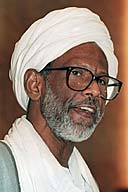Religion in Sudan
Religion in Sudan – as it relates to the Dinka
Some background information for you
Sudan is a Muslim country, with Muslims making up somewhere in the range of 70% of the people. The government that has been in power since 1989 has consciously based its administration - to varying degrees over the years - on Islamic values.
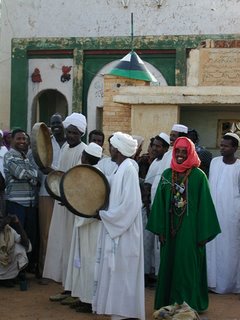
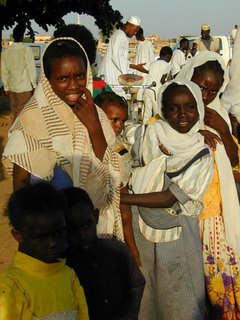
Photos: Muslims in Sudan
It is estimated that 20-25% of Sudanese follow a form of animism which is the religion of their ancestors. This leaves about 4-10% as Christians, though these numbers vary greatly depending on who you talk to. The people of the north are predominantly Sunni Muslims with most of the Southerners practicing the traditional religions or Christianity.
Traditional Religions- Animism
I often read that a majority of South Sudanese practiced animism and was never really sure what that meant exactly. With a little research I found out that animism is considered to be the original human religion. (I’m not sure why they had to specify “human.”)
The word ‘animism’ derives from the Latin word anima, meaning soul or breath. It is usually applied to any religious beliefs which recognize spirits or a spirit world inherent and controlling within the physical world. This religion is fairly common among aboriginal and native cultures. Basically animists acknowledge that there is a spiritual realm which humans share with the universe. With this as a basis, I can see how other religions grew out of this.
Dinka Religion
The Dinka have traditionally practiced a religion dominated by Nhialic (Sky) who is God and speaks through spirits who take possession of individuals. Sacrificing of cattle plays a big role in the religion. Since 1905, Christianity has made strong inroads into Dinka society and it appears to me that they practice some form of animist, polygamous form of Christianity. Most Dinkas I met consider themselves Christians and quite amazingly, the pictures of Jesus are the German stringy blonde-haired version. Most Dinkas I met also have a deep hatred for Islam, which at various times has been forced on them – only to see them reject it. Somewhere on this blog I describe Sharia law. Okay, back to the Dinkas.
They have one main God, the great universal spirit Nhialic, who speaks through spirits which take temporary possession of individuals in order to speak through them. The sacrificing of oxen by the "masters of the fishing spear" is a central component of the Dinka. They are the self-elected intermediaries between the people and the gods. I’m sure it’s no surprise to yo that cattle play a significant role in the religion. They are sacrifice to God as substitutes for their owners.
Some men and women are also believed to have extraordinary powers. In some cases it is feared that these people have the capacity to inflict harm on others. The concept of the sorcerer exists among the Dinka but it something that they fear from members of other tribes. Illness is sometimes blamed on a sorcerer. I’m really no expert on this – or anything else - but I know that these beliefs vary from tribe to tribe.
Christianity
Though Islam is the religion of the majority of the population, Christianity has a long history in Sudan beginning in the 4th century. It flourished until the 14th century when Islam virtually wiped out any signs of Christianity .
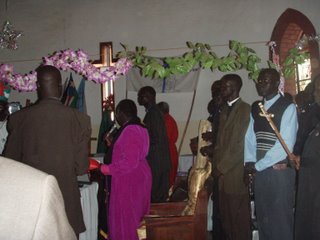
Christian missionaries began to show up in Sudan in the late 19th century, though Archibald Shaw, a missionary of the Church of England, (known simply as Shaw – and later by his given Dinka name, Matur) is credited with bringing Christianity to the Dinka. He spent many years in Malek – the site of the main leper colony in Southern Sudan (see below for some information about leprosy).
Christianity spread primarily through the cities and did not reach the villages until the 1980’s. With the outbreak of the civil war in 1983, many villagers were forced to move to the cities and were converted. One of the triggers of the civil war was the imposition of Sharia law on the south which has as tradition of fending off the Islam. The south Sudanese defended the area against the Ottoman Turks (who ruled Sudan) in the 19th century and repulsed any attempt to be converted to Islam. The civil war came (see the History section) and according to some sources it sparked an explosive growth of Christianity. In some ways, the English language and Christianity are symbols of resistance against the Arabic speaking Muslim north.
Today, Sharia law only applies to the Muslims in the North. In spite of a policy of separation of church and state, the teaching of Christianity to Christians in government schools is part of the curriculum, as is Islam to Muslims. Go figure.
Sidebar – Leprosy.
When I was in Malek and passed the Leper colony I realized that I knew nothing about the disease. In case you’re curious, here’s a brief description. I was particularly confused about whether leprosy was contagious or not.
Leprosy has a long history which I will not go into, but it is interesting to know that it is mentioned in the Old Testament. It also goes by the name Hanson’s Disease and is a chronic infectious disease cause by a bacteria. Today, it can be treated effectively with drugs, but if left untreated it causes severe disfigurement. It is almost never fatal.
Leprosy has instilled fear in people for centuries. The stigma attached to it has forced those infected to be shunned by family, friends and society. Today it is primarily found in only 11 countries of which Sudan is one.
Throughout the ages, it was thought to be a highly contagious disease. People believed that you could get it simply by touching an infected person. We still do not know exactly how the disease is transmitted from person to person. Some theories postulate that it is through nasal droplets released through sneezing. Only a small percentage of people who absorb this bacteria actually get the disease.
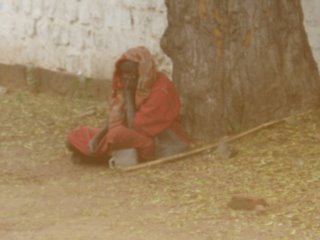 Photo: Leper as seen through a car window
Photo: Leper as seen through a car window
Some background information for you
Sudan is a Muslim country, with Muslims making up somewhere in the range of 70% of the people. The government that has been in power since 1989 has consciously based its administration - to varying degrees over the years - on Islamic values.


Photos: Muslims in Sudan
It is estimated that 20-25% of Sudanese follow a form of animism which is the religion of their ancestors. This leaves about 4-10% as Christians, though these numbers vary greatly depending on who you talk to. The people of the north are predominantly Sunni Muslims with most of the Southerners practicing the traditional religions or Christianity.
Traditional Religions- Animism
I often read that a majority of South Sudanese practiced animism and was never really sure what that meant exactly. With a little research I found out that animism is considered to be the original human religion. (I’m not sure why they had to specify “human.”)
The word ‘animism’ derives from the Latin word anima, meaning soul or breath. It is usually applied to any religious beliefs which recognize spirits or a spirit world inherent and controlling within the physical world. This religion is fairly common among aboriginal and native cultures. Basically animists acknowledge that there is a spiritual realm which humans share with the universe. With this as a basis, I can see how other religions grew out of this.
Dinka Religion
The Dinka have traditionally practiced a religion dominated by Nhialic (Sky) who is God and speaks through spirits who take possession of individuals. Sacrificing of cattle plays a big role in the religion. Since 1905, Christianity has made strong inroads into Dinka society and it appears to me that they practice some form of animist, polygamous form of Christianity. Most Dinkas I met consider themselves Christians and quite amazingly, the pictures of Jesus are the German stringy blonde-haired version. Most Dinkas I met also have a deep hatred for Islam, which at various times has been forced on them – only to see them reject it. Somewhere on this blog I describe Sharia law. Okay, back to the Dinkas.
They have one main God, the great universal spirit Nhialic, who speaks through spirits which take temporary possession of individuals in order to speak through them. The sacrificing of oxen by the "masters of the fishing spear" is a central component of the Dinka. They are the self-elected intermediaries between the people and the gods. I’m sure it’s no surprise to yo that cattle play a significant role in the religion. They are sacrifice to God as substitutes for their owners.
Some men and women are also believed to have extraordinary powers. In some cases it is feared that these people have the capacity to inflict harm on others. The concept of the sorcerer exists among the Dinka but it something that they fear from members of other tribes. Illness is sometimes blamed on a sorcerer. I’m really no expert on this – or anything else - but I know that these beliefs vary from tribe to tribe.
Christianity
Though Islam is the religion of the majority of the population, Christianity has a long history in Sudan beginning in the 4th century. It flourished until the 14th century when Islam virtually wiped out any signs of Christianity .

Christian missionaries began to show up in Sudan in the late 19th century, though Archibald Shaw, a missionary of the Church of England, (known simply as Shaw – and later by his given Dinka name, Matur) is credited with bringing Christianity to the Dinka. He spent many years in Malek – the site of the main leper colony in Southern Sudan (see below for some information about leprosy).
Christianity spread primarily through the cities and did not reach the villages until the 1980’s. With the outbreak of the civil war in 1983, many villagers were forced to move to the cities and were converted. One of the triggers of the civil war was the imposition of Sharia law on the south which has as tradition of fending off the Islam. The south Sudanese defended the area against the Ottoman Turks (who ruled Sudan) in the 19th century and repulsed any attempt to be converted to Islam. The civil war came (see the History section) and according to some sources it sparked an explosive growth of Christianity. In some ways, the English language and Christianity are symbols of resistance against the Arabic speaking Muslim north.
Today, Sharia law only applies to the Muslims in the North. In spite of a policy of separation of church and state, the teaching of Christianity to Christians in government schools is part of the curriculum, as is Islam to Muslims. Go figure.
Sidebar – Leprosy.
When I was in Malek and passed the Leper colony I realized that I knew nothing about the disease. In case you’re curious, here’s a brief description. I was particularly confused about whether leprosy was contagious or not.
Leprosy has a long history which I will not go into, but it is interesting to know that it is mentioned in the Old Testament. It also goes by the name Hanson’s Disease and is a chronic infectious disease cause by a bacteria. Today, it can be treated effectively with drugs, but if left untreated it causes severe disfigurement. It is almost never fatal.
Leprosy has instilled fear in people for centuries. The stigma attached to it has forced those infected to be shunned by family, friends and society. Today it is primarily found in only 11 countries of which Sudan is one.
Throughout the ages, it was thought to be a highly contagious disease. People believed that you could get it simply by touching an infected person. We still do not know exactly how the disease is transmitted from person to person. Some theories postulate that it is through nasal droplets released through sneezing. Only a small percentage of people who absorb this bacteria actually get the disease.
 Photo: Leper as seen through a car window
Photo: Leper as seen through a car window
